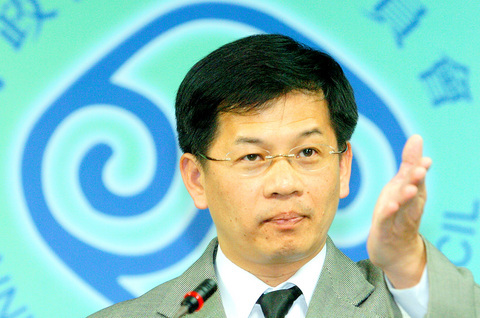In the wake of criticism that the government is violating freedom of press by banning Chinese journalists from Taiwan, the Mainland Affairs Council (MAC) countered yesterday with an attack on China's tight control over news coming from Taiwan, and requested that it lift bans on the Internet Web sites of two local newspapers.
"China's attitude toward the media is diametrically opposed to the principle of press freedom. This is what actually deserves criticism," MAC Vice Chairman David Huang (黃偉峰) said yesterday during a press conference.
He said that for starters China should "at the very least" lift Internet restrictions placed on the China Times and United Daily News. China blocks virtually all Taiwanese online news sites.

PHOTO: SEAN CHAO, TAIPEI TIMES
The council has protested these bans on several occasions, particularly in the wake of the "Anti-Secession" Law that Beijing recently adopted.
Council Chairman Joseph Wu (吳釗燮) had said during an interview with the Taipei Times last month that the removal of internet bans was the first step towards demonstrating a respect for public opinion and repairing the damage rendered by the Anti-Secession Law.
Similarly, Huang also said yesterday that the government's primary motivation in allowing Chinese correspondents to be stationed in Taipei was to promote bilateral ties by way of increasing China's understanding of Taiwan.
Huang's remarks came on the heels of the council's recent decision to suspend permits allowing Chinese state-run Xinhua News Agency and the People's Daily to post correspondents in Taiwan.
Huang noted however that its stated goals had not been achieved and had instead served to further strain relations by bringing about misunderstanding.
The council cited the distortion of information and the negative impact the reports had on cross-strait relations as reasons for the ban.
Xinhua News Agency's Taipei correspondent Zhang Mei (
Zhang said that the decision had come as "a shock" and that the council had not contacted her beforehand.
Despite the council's accusations that Xinhua often distorted the truth, she defended Xinhua's reports as "objective and balanced" and said that they had not deviated from their journalistic professionalism.
Another Chinese correspondent posted in Taipei yesterday said on condition of anonymity that the council's decision had made a "joke" of Taiwan's democracy and was a setback for cross-strait ties.
The reporter said that it was untrue that the Chinese media reported only on the negative aspects of Taiwan.
Huang made clear yesterday however that the council was not in anyway clamping down on negative reporting but rather the distorted and manipulative handling of news reports and the subsequent "negative impact" that such reporting had on ties.
"Clear and accurate information is best for cross-strait relations?as for whether the reports reflect negatively or positively [on Taiwan], I don't care," Huang said yesterday, citing reports that Xinhua had carried saying Taiwan welcomed the Anti-Secession Law despite several public opinion polls to the contrary.
He reiterated that the suspension was temporary and that it was motivated by the council's overall assessment of journalistic interactions across the Taiwan Strait.
He said that he hoped to see some regional Chinese media outlets posted in Taiwan.

Chinese Nationalist Party (KMT) Chairman Eric Chu (朱立倫), spokeswoman Yang Chih-yu (楊智伃) and Legislator Hsieh Lung-chieh (謝龍介) would be summoned by police for questioning for leading an illegal assembly on Thursday evening last week, Minister of the Interior Liu Shyh-fang (劉世芳) said today. The three KMT officials led an assembly outside the Taipei City Prosecutors’ Office, a restricted area where public assembly is not allowed, protesting the questioning of several KMT staff and searches of KMT headquarters and offices in a recall petition forgery case. Chu, Yang and Hsieh are all suspected of contravening the Assembly and Parade Act (集會遊行法) by holding

PRAISE: Japanese visitor Takashi Kubota said the Taiwanese temple architecture images showcased in the AI Art Gallery were the most impressive displays he saw Taiwan does not have an official pavilion at the World Expo in Osaka, Japan, because of its diplomatic predicament, but the government-backed Tech World pavilion is drawing interest with its unique recreations of works by Taiwanese artists. The pavilion features an artificial intelligence (AI)-based art gallery showcasing works of famous Taiwanese artists from the Japanese colonial period using innovative technologies. Among its main simulated displays are Eastern gouache paintings by Chen Chin (陳進), Lin Yu-shan (林玉山) and Kuo Hsueh-hu (郭雪湖), who were the three young Taiwanese painters selected for the East Asian Painting exhibition in 1927. Gouache is a water-based

Taiwan would welcome the return of Honduras as a diplomatic ally if its next president decides to make such a move, Minister of Foreign Affairs Lin Chia-lung (林佳龍) said yesterday. “Of course, we would welcome Honduras if they want to restore diplomatic ties with Taiwan after their elections,” Lin said at a meeting of the legislature’s Foreign Affairs and National Defense Committee, when asked to comment on statements made by two of the three Honduran presidential candidates during the presidential campaign in the Central American country. Taiwan is paying close attention to the region as a whole in the wake of a

OFF-TARGET: More than 30,000 participants were expected to take part in the Games next month, but only 6,550 foreign and 19,400 Taiwanese athletes have registered Taipei city councilors yesterday blasted the organizers of next month’s World Masters Games over sudden timetable and venue changes, which they said have caused thousands of participants to back out of the international sporting event, among other organizational issues. They also cited visa delays and political interference by China as reasons many foreign athletes are requesting refunds for the event, to be held from May 17 to 30. Jointly organized by the Taipei and New Taipei City governments, the games have been rocked by numerous controversies since preparations began in 2020. Taipei City Councilor Lin Yen-feng (林延鳳) said yesterday that new measures by